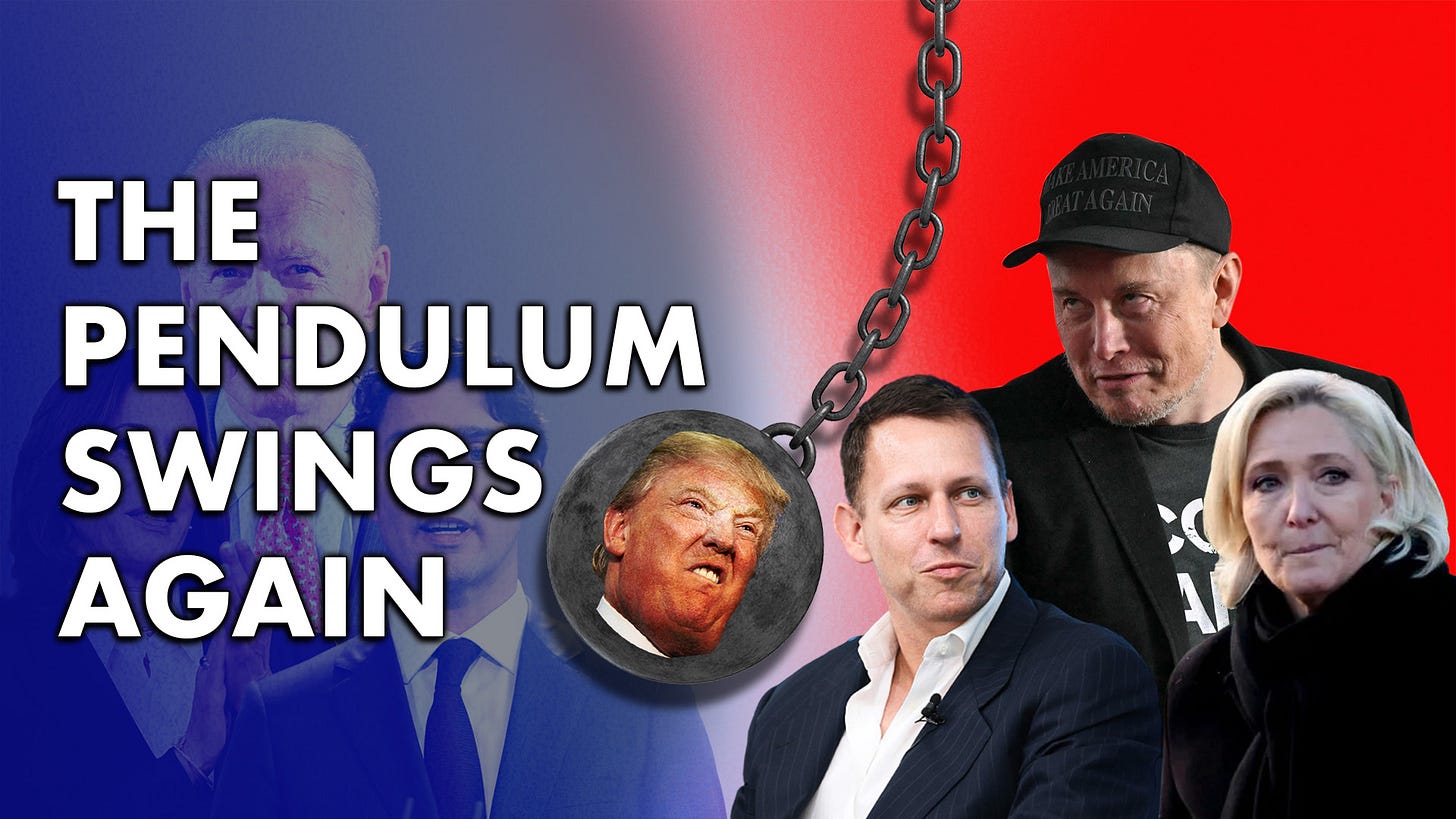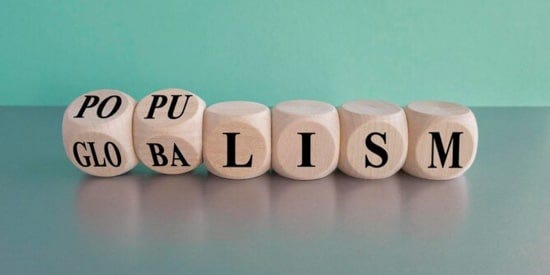Back and to the Right: The Pendulum Swings Again
by James Corbett
corbettreport.com
February 9, 2025
Have you noticed something interesting about global politics in recent years?
Populist movements, right-wing politicians and formerly verboten political ideas are growing in popularity around the world, from Trump and MAGA (and even MAHA) in the US to the AfD party in Germany to Milei in Argentina—and many other examples.
As interesting as this political shift is, however, the reaction to the phenomenon by the globalist Deep State is even more fascinating.
The infamous Bilderberg Group has fretted about "Populism in Europe" at its recent gatherings.
The World Economic Forum's ongoing focus on "Rebuilding Trust" in globalist institutions is a tacit admission that they are losing the battle for the hearts and minds of the public.
And Tony Blair just said the quiet part out loud by admitting that one of the benefits of the coming digital ID control grid is that it will allow the authoritarians to "get tough on populism."
So, what on earth is happening here? Are we witnessing a revolution? And, if so, what does it mean for our future?
Let's find out.
THE SHIFT
In case you haven't noticed, world politics looks very different today than it did even a few years ago.
Biden is out, Trump is in.
Trudeau is on his way out, and Poilievre is (almost certainly) on his way in.
Macron is teetering, and Le Pen is waiting in the wings.
The Germans are flirting with AfD.
Farage is the most popular politician in the UK.
Meloni is constructing a banking empire as she consolidates power in Italy.
A self-described "anarcho-capitalist" (a title disputed by some, to be fair) is in charge of Argentina.
Indeed, a slew of populist politicians and parties and movements around the world have drastically shifted the tone of political rhetoric in the last decade.
And it's not just in the realm of politics that we have witnessed this cultural shift.
DEI is over, ESG is kaput, and the climate finance oligarchy is falling apart.
Zuckerberg and the other Big Tech oligarchs are lining up to pay homage to Trump and they're now all Elon-style based memelords who are "ending censorship" of right-wing opinions (after years of gaslighting the public by insisting that censorship wasn't happening).
Whatever your take on the tectonic shifts taking place in the cultural landscape, one thing is for certain: the old political verities are being called into question, and surprising new political, social and cultural movements are rising up to take their place.
For those who've been living in a paradigm where advocacy of free speech, distrust of intelligence agencies and opposition to Big Business were the domain of the political left, it's no doubt disorienting to see college progressives opposing freedom of speech, Democrats applauding the CIA and Elizabeth Warren defending Big Pharma.
What the hell is happening?
In order to understand this multifaceted phenomenon, let's look at one aspect of it: the reimagining of the fight against "the establishment."
THE MEANING OF "ANTI-ESTABLISHMENT"
Since the manufacturing of teen culture in the 1950s (and due in no small part to the rise of mass media in the 20th century), Western culture has venerated one particular trope: that of rebellious youths rising up against their stuffy, conservative parents.
So oft-told is the Baby Boomer coming-of-age tale about a young man or woman defying their parents by growing out their hair, dropping out of college and joining the anti-war movement that this narrative cliché now stands (at least in the American popular imagination) as the archetypical story of the 1960s.
It's easy to see why this story appealed to the populist sentiment of the time. By "tuning in, turning on and dropping out," the younger generation created a "youthquake" that shook "the establishment" to the core.
This story of rebellion manifested itself culturally, in the veneration of counterculture icons like James Dean (the Rebel Without A Cause); in the rise of protest music, rock'n'roll and risqué fashion; and in the advent of "the pill," the subsequent promotion of "free love" and, eventually, the attendant dissolution of the traditional family structure.
But, importantly, this renegade spirit also manifested itself politically. Although the tie-dyed, long-haired, socks-and-sandals set eventually put on shirts and ties and joined the workaday world, they would never abandon the political worldview they had adopted during their coming-of-age era. In the US specifically, the Boomers' political consciousness—forged in the crucible of the civil rights movement and the Vietnam War protest movement—associated the term "establishment" with the conservatives they had opposed in the 1960s and the term "anti-establishment" with the left-wing progressives who had marched alongside them.
No Boomer, in other words, had to be told who the "short-haired, yellow-bellied son[s] of Tricky Dicky" were or on which side of the political aisle those sons were standing.
That's why the inversion that has taken place in recent years is so difficult for those of a certain vintage to understand. To them, the "establishment" has always represented conservative values and (by extension) Republican politicians. The "anti-establishment" has always been populated by progressives, radicals and activists on the far-left wing of the political spectrum.
But all that has changed.
Do you remember when advocacy of same-sex marriage was an idea too radical even for left-wing politicians?
Do you remember when a President having sex with his intern in the Oval Office was dismissed as a trivial issue—though it was perfectly acceptable to shame the intern for the affair?
Do you remember when Ace Ventura's over-the-top reaction to his Einhorn discovery was treated as a hilarious joke rather than an example of "insanely transphobic" movie-making deserving of a "re-evaluation"?
For all of you who answered "yes" to the above questions, keep in mind that there's an entire generation growing up today who don't remember those things.
For the Gen Zers (and now the Gen Alphas), there has never been a time when "the establishment"—from the politicians running the country to the media figures and celebrities appearing on their screens to the teachers at their schools to the corporations plying them with products—has been opposed to those ideas once considered so "radical" and "progressive."
Of course the Biden administration appointed a "dog-role-playing fetishist" to a top position in the Office of Nuclear Energy before firing him—errr, I mean firing "them"—for repeatedly stealing luggage at airports . . . and if you think that's odd, you're a bigot who deserves to be cast out of polite society!
Of course teachers spend their days at school casually wishing death on conservative Christians, and if you don't think the teacher is the real victim here then you're probably one of those "bitter clingers" who deserve to die!
Of course Gillette made ads insulting their own customers for their supposed "toxic masculinity" and of course Bud Light partnered with a transgender influencer to market their beer and of course Lockheed Martin sponsors Pride Month events and how dare you question the virtue of their public advocacy!
Yes, for as long as today's younger generation can remember, "the establishment" has been synonymous with identity politics and woke virtue signalling. It doesn't take a genius, then, to figure out that for this generation, being "anti-establishment" means living the Baby Boomers' coming-of-age tale in reverse—i.e., cutting their hair short, dressing in suits, rejecting "free love" and going to church.
And—wouldn't ya know it?—that's exactly what's been happening in recent years.
In fact, not only do Gen Zers self-identify as more conservative than previous generational cohorts, they are also, according to some overzealous clickbait headline writers, possibly "the most conservative generation in history." The old truism that children are always more progressive and left-leaning than their parents, it turns out, isn't an ironclad law of the universe, as generations of people in the West have come to assume.
Naturally, this political shift is manifesting itself in every aspect of society and culture.
Gen Zers are having less sex than previous generations and are even less interested in seeing sex depicted in movies.
Gen Zers are re-popularizing traditional gender roles and family dynamics, with Gen Z men gravitating to the "manosphere" and Gen Z women embracing the "tradwife" lifestyle.
Even religion is reasserting itself, with Gen Zers half as likely as their parents to call themselves atheists and young men converting to Orthodox Christianity in record numbers.
There is one simple way to contextualize these sweeping changes: we can relate them to the swing of the political pendulum. The political world had swung so far to the left that a swing back to the right was inevitable, and that is exactly what we are seeing now.
From this viewpoint, there's a strange mirror-image similarity between the hippies, the extreme counter-cultural elements of the 1960s, and the tiki-torch-bearing white identitarians and Nazi flag-waving extreme counter-cultural elements of the Gen Z crowd: they are both defying political convention in ways that are sure to shock their parents' generation.
But if we stop our analysis here, we run the risk of assuming we're merely living through some generational cycle that has always existed and will always continue to exist for the rest of human history.
As it turns out, the pendulum swing from left to right and back again does not adequately describe our political reality. To truly understand what is happening, we need to think outside the box . . . or should that be "outside the spectrum"?
STUCK IN THE PENDULUM?
So, as we have seen, over the course of the past half-century, the political pendulum has swung from right to left to right again. Right?
The pendulum analogy does, of course, explain the self-evident reality of the worldwide shift toward right-wing parties and ideas. But it does not explain a different, puzzling, usually ignored aspect of this apparent pendulum swing—namely, that no matter which side of the pendulum is in the ascendant, the key agenda items of the oligarchs and the globalists continue to be forwarded.
The populist protesters of the 1960s weren't wrong to identify the establishment of their day as conservative, and they weren't wrong to be upset by the policies and actions of that establishment. The establishment was pro-censorship. The establishment was in favour of the banking cartel that wields power from behind the scenes. The establishment supported genocidal wars of aggression around the world. The hippies correctly identified these problems and protested the rich and powerful interests that promoted them.
Similarly, the populist protesters of the 2020s aren't wrong to identify the establishment of their day as progressive, and they aren't wrong to be upset by the policies and actions of that establishment. The establishment is pro-censorship. The establishment is in favour of the banking cartel that wields power from behind the scenes. The establishment supports genocidal wars of aggression around the world. The Gen Zers rising up against the woke politics of recent years have correctly identified these problems and are protesting the rich and powerful interests that promote them.
Looking at how little of substance actually changes during each swing of the pendulum, one might wryly observe that all that this swing actually decides is whether to paint rainbow flags on the drone bombers that are sent to massacre some far-away people or whether to paint the stars and stripes on those same drone bombers.
Extrapolating, one can well imagine that the children of the Gen Zers and Gen Alphas will rise up against the establishment of the mid-21st century in the next iteration of this inevitable oscillation. That future establishment—as we have already seen—will be pro-censorship. That establishment will be in favour of the banking cartel that wields power from behind the scenes. That establishment will support genocidal wars of aggression around the world. And the Gen Nexters (or whatever they're dubbed) who rise up against the establishment of the future will no doubt correctly identify these problems and protest the rich and powerful interests promoting them.
Is this simply our fate? Should we resign ourselves to the never-ending cycle of right and left and right again—and to the oligarchs who are accruing more and more power over us all the while?
No.
One of the greatest tricks the oligarchs have ever pulled is to convince the public that this swing of the pendulum is the only conceivable political reality. After all, there's a left wing. There's a right wing. There's even a center. And they all support censorship and banking cartels and wars of aggression. Deal with it, peasant!
But this is a lie. There is an entire other dimension to politics, one that has been deliberately withheld from our attention. Why? Because knowledge of this dimension would threaten the entire system of oligarchical, globalist control as it exists.
So, what is this extra political dimension? Excellent question! And one that I will answer in this very column later this month. Stay tuned . . .
Like this type of essay? Then you’ll love The Corbett Report Subscriber newsletter, which contains my weekly editorial as well as recommended reading, viewing and listening. If you’re a Corbett Report member, you can sign in to corbettreport.com and read the newsletter today.
Not a member yet? Sign up today to access the newsletter and support this work.





